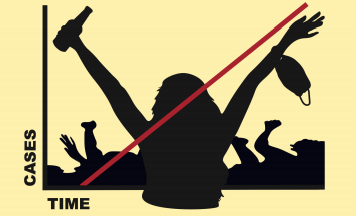
By Sean McGurn
Staff Writer
As Saint Michael’s students power through their fourth week on campus following a successful first round of completely negative covid tests, many begin to worry about the student’s mindsets involving signs of overconfidence, and reduced personal concern towards the virus.
When the first batch of results on all on-campus students were reported back there was definitive joy and relief from many but also some speculation that the all negative results were simply too good to be true and concerns that students aren’t following the rules “It is disappointing that people are not fully listening to the rules,” said Nate Imbergamo ’22. “We need to see the bigger picture here,” he added, noting that students could all suddenly be sent home for good.
The state of Vermont is doing exceptionally well in comparison to the rest of the nation and at a recent press conference the governor welcomed Dr. Anthony Fauci, the top infectious disease expert on the White House Covid task force. He warned that we cannot let our guards down now. The University of Vermont has reported less than 10 cases and Champlain College just a single case. By comparison, some colleges in other states have high incidence: Outside of the state, The University of Alabama and Georgia have more than 2,300 cases each as students returned for this Fall semester.
Coach Hall, head coach of the swimming and diving team, said we must take a step back to see what it is that we are here for. She suggests students should be “making a list of all the things that they value”.
From a psychological standpoint, students on campus may be starting to act in ways that are influenced by arrogance and feelings of invincibility. “There are things we can do to prevent falling into the overconfidence ‘trap’,” said psychology professor Sarah Nosek. Her tips include avoiding relying on ‘word of mouth’ and avoiding the tendency to listen to things that confirm our belief systems–a concept known as confirmation bias. Nosek as well as many professors that have been asked are extremely happy to be back on campus “Being on campus together this fall is a privilege and one that can change very quickly if people start to get sick,” said Nosek.

One professional in particular who reiterates this point is Covid Action Network (CAN!) advisor and political science professor Patricia Siplon. She works with a student led program helping to prevent covid-19 on campus. Siplon emphasizes harm reduction which will allow for students to still interact with each other in acceptable ways but make sure that the risks are limited for certain behaviors. “The campus will continue to operate on the lower level of risk,” said Siplon.
Students should simply continue to follow the same respectful and worthwhile practice that they have been since Covid-19 was classified as a pandemic back in March of 2020. If we come together (not physically) as a student body we have the power to encourage our peers to make the right choices and to take those down off their pedestals if they begin to show signs of overconfidence, and letting their much needed pandemic guard down.

